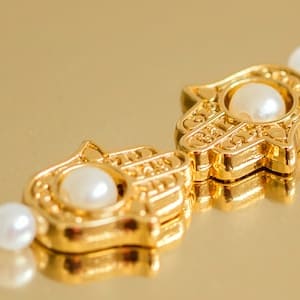pearl-clutcher: Idiom Meaning and Origin
What does ‘pearl-clutcher’ mean?
A "pearl-clutcher" refers to someone who is easily shocked or scandalized by something. They are often seen as traditional or conservative in their views.

Idiom Explorer
When someone's jaw drops, it means they are extremely surprised or shocked by something they have just heard or seen.
The idiom "quiche-eater" refers to a person who is seen as overly refined, sophisticated, or effeminate, often mocking their taste for delicate or gourmet foods. It is a derogatory term often used to criticize someone's masculinity or lack thereof.
To "pull someone's plumes" means to humiliate or embarrass someone by exposing their weaknesses or faults.
The idiom "pea patch" refers to a place where one feels a sense of comfort and contentment. It symbolizes a peaceful and enjoyable environment.
The idiom "peanut gallery" refers to a group of people, often spectators or critics, who offer loud and uninformed commentary or opinions. The term originated from vaudeville theaters where cheap seats were known as the "peanut gallery."
The idiom "peaches and cream" refers to something that appears to be perfect, flawless, or ideal.
An idiom that describes someone who is extremely patient, calm, and tolerant, like an angel. The phrase suggests a high level of endurance in difficult situations.
The idiom "party animal" refers to someone who enjoys attending and participating enthusiastically in parties or social events. This person is known for their lively and energetic behavior and is often the life of the party.
Hidden Fascination
The idiom "pearl-clutcher" is often used to describe someone, typically a woman, who is seen as oversensitive or easily offended.People use this term when someone is making a big deal out of something trivial. The phrase likely gained popularity in American culture, where the image of a woman clutching her pearls as a symbol of delicate femininity was prevalent.
"Pearl-clutcher" is used in a mocking or dismissive manner, implying that the person labeled as such is overreacting. It often carries a connotation of moral indignation or prudishness, suggesting that the person is excessively concerned with maintaining proper decorum or being easily scandalized.
This idiom has found its way into popular culture and is often used in literature, film, and television to portray a character as a pearl-clutcher to convey a particular type of personality or attitude.
It is important to note that the use of the term "pearl-clutcher" can reinforce harmful stereotypes about women. The idiom reinforces the notion that women are hypersensitive or overly concerned with appearances, which can contribute to the marginalization and belittlement of women's experiences.
While the term "pearl-clutcher" may be seen as a playful or humorous way to describe someone who is easily shocked, it is essential to consider the broader implications of using such a label. It is crucial to ensure that language and idioms are not used to reinforce stereotypes or perpetuate harmful ideas.
Another related idiom is "pull someone's plumes," which means to humiliate or embarrass someone, usually in front of others. This phrase also carries a connotation of prudishness or exaggerated sensitivity. While not as commonly used as "pearl-clutcher," it shares similar themes and implications.
Imagine a scene at a dinner party where someone makes an off-color joke that another guest finds offensive. Instead of simply expressing their discomfort or disapproval, the offended guest may "pull the plumes" of the person who made the joke, embarrassing them and asserting their own moral superiority. This act of humiliating another person can be seen as an exaggerated reaction, similar to how a pearl-clutcher is perceived.
Yet another related idiom is "quiche-eater," which refers to someone who is perceived as overly refined or pretentious in their tastes or behaviors, particularly in matters of food. This idiom, like "pearl-clutcher" and "pull someone's plumes," carries a connotation of prudishness and exaggerated sensitivity.
The phrase likely originated from the association of quiche with French cuisine, which has a reputation for being sophisticated and refined. By labeling someone as a "quiche-eater," it suggests that they are overly concerned with appearances and have a preference for luxury or extravagant things.
The idiom "pearl-clutcher" is used to describe someone who is seen as oversensitive or easily offended. It often carries a connotation of moral indignation or prudishness and can reinforce harmful stereotypes about women. It is important to be mindful of the language and idioms we use to ensure that we do not perpetuate harmful ideas or reinforce stereotypes.
Example usage
Examples of how the idiom "pearl-clutcher" can be used in a sentence are:
- She is such a pearl-clutcher, always getting worried about the smallest things.
- When she heard the shocking news, she became a pearl-clutcher, clutching her pearls in disbelief.
- I couldn't help but chuckle at the pearl-clutcher's reaction when the magician made the rabbit disappear.
The idiom "pearl-clutcher" is used to describe someone who is easily shocked, outraged, or scandalized by certain events or behaviors. It implies that this person is overly dramatic or prudish in their reactions. The association with clutching pearls is a metaphor for expressing shock or distress. It is often used in a humorous or mocking manner to highlight someone's exaggerated response to a situation that may not warrant such a strong reaction.
More "Expression" idioms



